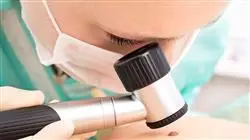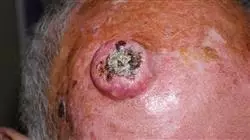University certificate
The world's largest faculty of medicine”
Introduction to the Program
Thanks to this Postgraduate diploma you will improve your knowledge in advanced skin biology for a more efficient diagnosis of cancerous pathologies"

Recent studies have shown that patients with Gardner Syndrome have a higher probability of developing Basal Cell Carcinoma, Squamous Cell Carcinoma and Malignant Melanoma compared to the general population. This is due to the presence of inherited genetic mutations that affect cell growth regulation and DNA repair. For this reason, it is important for the clinical specialists to be constantly informed of the latest scientific evidence that allows them to be up to date with the latest diagnostic techniques, evaluation, treatment and prevention of this pathology and other similar diseases.
In this sense, TECH has designed this program that allows the professional to experience an adequate education about the risk factors of Skin Cancer. This way, the clinical specialist will deepen in hereditary diseases with cutaneous manifestations, oral cavity squamous cell carcinoma, Kaposi's sarcoma and other cutaneous neoplasms. Likewise, they will expand their knowledge of diagnostic tests in skin cancer, dermoscopy and molecular biology techniques.
Also, this Postgraduate diploma provides versatility, which will allow the physician to access its content at any time and location. In addition, this curriculum incorporates in its teaching methodology the Relearning system, which facilitates the consolidation of the most important concepts in a faster way. All this, accompanied by a variety of pedagogical resources such as real case studies and video summaries stored inb a virtual library with unlimited access from any device connected to the network.
You will identify and evaluate the most recurrent Risk Factors for Skin Cancer such as skin photo-types and chemical exposure"
This Postgraduate diploma in Risk Factors for Skin Cancer contains the most complete and up-to-date scientific program on the market. The most important features include:
- The development of case studies presented by experts in Dermatology, Oncology and Plastic and Reconstructive Surgery
- The graphic, schematic, and practical contents with which they are created, provide scientific and practical information on the disciplines that are essential for professional practice
- Practical exercises where the self-assessment process can be carried out to improve learning
- Its special emphasis on innovative methodologies
- Theoretical lessons, questions to the expert, debate forums on controversial topics, and individual reflection assignments
- Content that is accessible from any fixed or portable device with an Internet connection
An academic option that will allow you to stay ahead of advances in nucleic acid hybridization techniques"
The program's teaching staff includes professionals from the sector who contribute their work experience to this program, in addition to renowned specialists from leading societies and prestigious universities.
Its multimedia content, developed with the latest educational technology, will provide the professional with situated and contextual learning, i.e., a simulated environment that will provide an immersive education programmed to learn in real situations.
The design of this program focuses on Problem-Based Learning, by means of which the professional must try to solve the different professional practice situations that are presented throughout the academic course. For this purpose, the student will be assisted by an innovative interactive video system created by renowned experts.
With this 100% online program you will address the different types of Skin Cancer from Melanoma to unrelated diseases"

You will be up to date on the clinical signs that could make the difference in the early diagnosis of skin cancer"
Why study at TECH?
TECH is the world’s largest online university. With an impressive catalog of more than 14,000 university programs available in 11 languages, it is positioned as a leader in employability, with a 99% job placement rate. In addition, it relies on an enormous faculty of more than 6,000 professors of the highest international renown.

Study at the world's largest online university and guarantee your professional success. The future starts at TECH”
The world’s best online university according to FORBES
The prestigious Forbes magazine, specialized in business and finance, has highlighted TECH as “the world's best online university” This is what they have recently stated in an article in their digital edition in which they echo the success story of this institution, “thanks to the academic offer it provides, the selection of its teaching staff, and an innovative learning method aimed at educating the professionals of the future”
A revolutionary study method, a cutting-edge faculty and a practical focus: the key to TECH's success.
The most complete study plans on the university scene
TECH offers the most complete study plans on the university scene, with syllabuses that cover fundamental concepts and, at the same time, the main scientific advances in their specific scientific areas. In addition, these programs are continuously being updated to guarantee students the academic vanguard and the most in-demand professional skills. In this way, the university's qualifications provide its graduates with a significant advantage to propel their careers to success.
TECH offers the most comprehensive and intensive study plans on the current university scene.
A world-class teaching staff
TECH's teaching staff is made up of more than 6,000 professors with the highest international recognition. Professors, researchers and top executives of multinational companies, including Isaiah Covington, performance coach of the Boston Celtics; Magda Romanska, principal investigator at Harvard MetaLAB; Ignacio Wistumba, chairman of the department of translational molecular pathology at MD Anderson Cancer Center; and D.W. Pine, creative director of TIME magazine, among others.
Internationally renowned experts, specialized in different branches of Health, Technology, Communication and Business, form part of the TECH faculty.
A unique learning method
TECH is the first university to use Relearning in all its programs. It is the best online learning methodology, accredited with international teaching quality certifications, provided by prestigious educational agencies. In addition, this disruptive educational model is complemented with the “Case Method”, thereby setting up a unique online teaching strategy. Innovative teaching resources are also implemented, including detailed videos, infographics and interactive summaries.
TECH combines Relearning and the Case Method in all its university programs to guarantee excellent theoretical and practical learning, studying whenever and wherever you want.
The world's largest online university
TECH is the world’s largest online university. We are the largest educational institution, with the best and widest online educational catalog, one hundred percent online and covering the vast majority of areas of knowledge. We offer a large selection of our own degrees and accredited online undergraduate and postgraduate degrees. In total, more than 14,000 university degrees, in eleven different languages, make us the largest educational largest in the world.
TECH has the world's most extensive catalog of academic and official programs, available in more than 11 languages.
Google Premier Partner
The American technology giant has awarded TECH the Google Google Premier Partner badge. This award, which is only available to 3% of the world's companies, highlights the efficient, flexible and tailored experience that this university provides to students. The recognition as a Google Premier Partner not only accredits the maximum rigor, performance and investment in TECH's digital infrastructures, but also places this university as one of the world's leading technology companies.
Google has positioned TECH in the top 3% of the world's most important technology companies by awarding it its Google Premier Partner badge.
The official online university of the NBA
TECH is the official online university of the NBA. Thanks to our agreement with the biggest league in basketball, we offer our students exclusive university programs, as well as a wide variety of educational resources focused on the business of the league and other areas of the sports industry. Each program is made up of a uniquely designed syllabus and features exceptional guest hosts: professionals with a distinguished sports background who will offer their expertise on the most relevant topics.
TECH has been selected by the NBA, the world's top basketball league, as its official online university.
The top-rated university by its students
Students have positioned TECH as the world's top-rated university on the main review websites, with a highest rating of 4.9 out of 5, obtained from more than 1,000 reviews. These results consolidate TECH as the benchmark university institution at an international level, reflecting the excellence and positive impact of its educational model.” reflecting the excellence and positive impact of its educational model.”
TECH is the world’s top-rated university by its students.
Leaders in employability
TECH has managed to become the leading university in employability. 99% of its students obtain jobs in the academic field they have studied, within one year of completing any of the university's programs. A similar number achieve immediate career enhancement. All this thanks to a study methodology that bases its effectiveness on the acquisition of practical skills, which are absolutely necessary for professional development.
99% of TECH graduates find a job within a year of completing their studies.
Postgraduate Diploma in Risk Factors for Skin Cancer
If you are a health professional interested in deepening your knowledge of the risk factors associated with cutaneous cancer and in the prevention of this disease, this is your opportunity to obtain specialized and updated training in this important field of oncology. TECH Global University has developed the Postgraduate Diploma in Risk Factors for Skin Cancer, which will allow you to acquire specific knowledge and skills to identify and address the factors that contribute to the development of this disease, you will be prepared to work in hospitals, dermatological clinics, cancer prevention centers and other institutions that provide specialized care in cutaneous oncology. You will be able to contribute significantly to the early detection and prevention of skin cancer, improving people's quality of life and reducing the incidence of this disease.
Explore the Risk Factors of Cutaneous Cancer
Our teaching team is made up of healthcare professionals with extensive experience in dermatologic oncology and skin cancer prevention. They will guide and support you throughout your learning, ensuring that you acquire the skills you need to excel in your career as a cutaneous cancer risk factor expert. Here, you will immerse yourself in the study of the theoretical and practical underpinnings of risk factors, understanding the characteristics and behaviors that increase susceptibility to developing skin cancer. You will learn how to assess exposure to solar radiation, genetic predisposition, the presence of atypical moles and other factors that may contribute to the development of skin cancer. In addition, you will explore prevention and early detection strategies, as well as the importance of education and self-care to reduce the risk of this disease. With our Postgraduate Diploma you will not only gain technical skills, but you will also develop the ability to promote awareness and prevention of this disease in the community. Join our online university and become a Cutaneous Cancer Risk Factor Expert!







